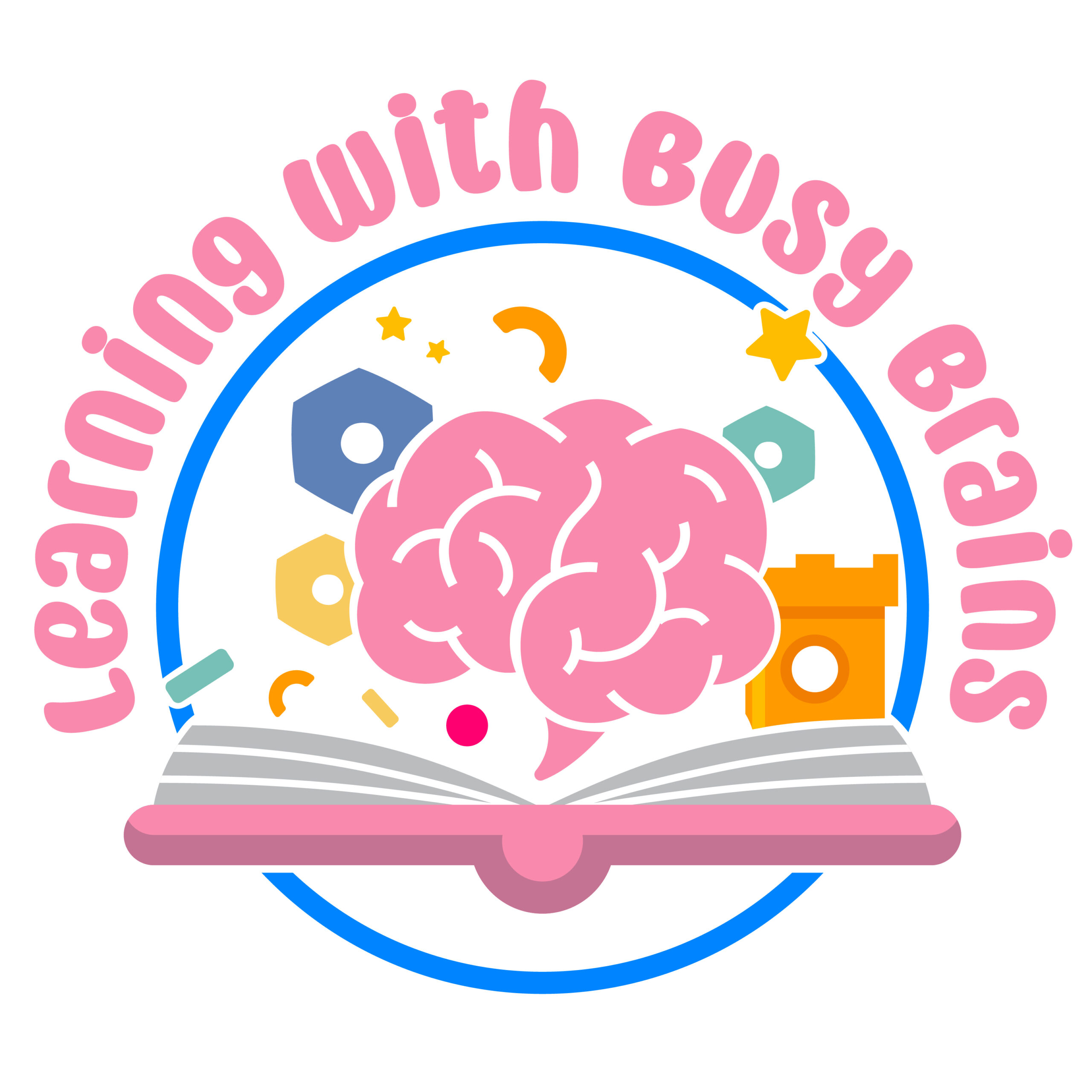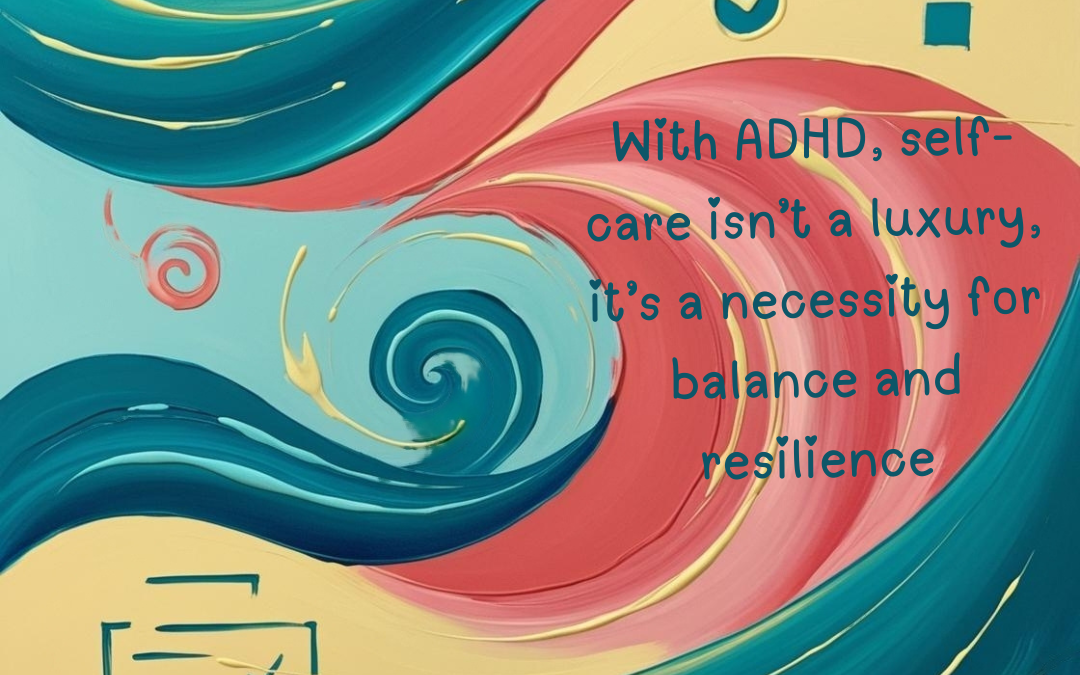Self-care is essential for everyone
For many, it’s seen as something that helps us recharge, maintain our physical and emotional well-being, and show up for the things that matter. But when it comes to people with ADHD, self-care isn’t just important: it’s critical. Over the years, I’ve learned firsthand why it’s not just a good idea, but a necessity, and how ADHD amplifies the need for it.
Why Self-Care Is Even More Important for Those with ADHD
People with ADHD already face unique challenges that make daily life more demanding. From struggles with time management, emotional regulation, to impulsivity and forgetfulness, we often find ourselves overwhelmed by the sheer weight of responsibility. These challenges, while manageable for some, can feel like a constant uphill battle for us, which is why self-care becomes even more important.
Self-Care and ADHD: Why We Tend to Ignore Small Signs Until It’s Too Late
When you have ADHD, it’s easy to ignore the small signs of discomfort or neglect your routine. Think about it like this:
How many times have you ignored a slight tooth pain, only to end up at the dentist when the pain has gotten so bad that the tooth needs to be pulled? Or maybe you’ve pushed through a little gastric discomfort, not giving it much thought, until it turns into something like GERD that requires serious treatment.
Or perhaps you’ve ignored a nagging back pain, only to find out later that you’ve developed a slipped disc, which now requires a lengthy recovery or even surgery.
This is something many of us with ADHD do with our own well-being. At first, the signals are subtle, maybe it’s a bit of fatigue, stress, or anxiety, but because we often don’t prioritize self-care, we don’t tend to these early signs. Over time, they compound, and what could have been easily fixed or managed gets much worse.
How many times have I encountered fellow ADHDers who struggle with multiple health issues, yet they can’t figure out why they’re facing so many problems? They’re puzzled, unsure of the root cause. Often, they don’t realize that these health issues are connected to their ADHD and the pattern of neglecting their well-being.
How ADHD Affects Our Self-Care Routine
People with ADHD often find that self-care routines are challenging to maintain, especially during calm periods. When everything is going smoothly, it’s easy to forget the habits that keep us in a good place: things like eating healthy, exercising, or managing stress. In fact, we tend to thrive during moments of crisis, this is us, this is our reality. When the pressure’s on, we can hyper-focus on the immediate problem and manage it well (I do this all the time—my husband can vouch for me!). Our mind is quick to solve problems. But, once the pressure lets up, so does our motivation. That’s when we tend to slip into neglecting our self-care, until the next health crisis hits. Sounds familiar?
For example:
- We might manage to follow through with our exercise routine when stress or illness is present, but once we feel better, we stop doing it regularly.
- We might take a break to relieve anxiety only when it’s severe, but forget to maintain smaller daily practices that prevent it from escalating.
It’s like putting off the maintenance of your health, only to end up with bigger issues down the road, requiring more intense treatment.
Breaking the Cycle: Why Self-Care Can’t Be Ignored
I’ve learned that neglecting self-care might feel manageable in the short term, but over time, it catches up. By skipping over the small signs and waiting for the symptoms to worsen, it becomes harder to bounce back and takes longer to recover. It’s not just about waiting for a crisis to motivate us. Consistent, small actions are what prevent the bigger problems.
We have to remember to care for ourselves daily, even when we don’t feel the pressure. It doesn’t mean waiting for things to get out of control to do something about it—it means starting the small habits now, before they become a problem later.
Why Self-Care is Even More Important for Women with ADHD
For women with ADHD, it can feel like everything is in chaos: pregnancy, childbirth, hormone imbalances, and the postpartum period all add extra layers of complexity. And when we reach our 40s, we enter perimenopause, it feels like the challenges are tripled. On top of all this, we are tasked with tarbiyyah—the nurturing and education of our children, we are the first school, remember?. As mothers, we also need to become experts in nutrition, experimenting with dietary choices to break the cycle of self-care neglect. And, of course, we wear the many hats of being wives and caregivers. It’s a lot to juggle, and it’s easy to feel overwhelmed. But in order to fulfill these roles with strength and purpose, we must prioritize our health. By seeking balance through healthy routines, consistent self-care, and taking care of our physical and mental well-being, we can better serve our families and ourselves.
Remember, making du’a for Allah’s help is essential, but we also need to make the effort—Allah loves consistency in His believing servants. You’ve been given the gift of ADHD for being hyperactive, so use that energy and drive to create something meaningful in your life. Channel it into being resourceful and productive. By doing this, you not only strengthen yourself but also draw closer to Allah, fulfilling your role as a servant in the best way possible.
Why Routine Matters with ADHD
Always remember this and place it on your wall at home, especially when things feel calm—because that’s when something might be wrong. When life is calm, it’s easy for our ADHD brains to forget the structure and habits we know we need. We get distracted, and suddenly, a few days or even weeks go by without doing the things that sustain us.
So, how do we break the cycle?
- Ask Allah for Help: Seek Allah’s guidance and strength to break the cycle of neglect. Ask Him to increase your knowledge, wisdom, and self-awareness, helping you prioritize your well-being and establish a consistent routine. Trust in Allah’s support to overcome ADHD challenges, remain patient, and stay committed to your health before small issues become bigger ones.
- Engage in Acts of Obedience: Repent and ensure you safeguard your daily obligatory prayers. Maintain your daily adhkar (remembrance of Allah) and try to avoid sins. Strengthening your relationship with Allah through these acts will give you the foundation of spiritual strength to manage ADHD’s challenges and support your overall well-being.
- Set Realistic, Small Goals: Start with small, achievable goals like drinking more water or getting a bit of exercise each day to build momentum without feeling overwhelmed.
- Create Visual Reminders: Use reminders like post-it notes, calendars, or checklists placed in visible areas around your home to keep track of essential tasks.
- Build Consistency into Your Routine: Even when things are calm, try to stick with small routines, focusing on consistency rather than perfection. “The most beloved deeds to Allah are those which are done consistently, even if they are small.” Sahih al-Bukhari 6464
- Set Alarms and Use Timers: Use alarms or timers to remind you to take breaks, eat meals, or stay on track with other self-care habits throughout the day. During the day, I rely on a simple hexagon-shaped timer I bought from Shopee Malaysia, made in China. It’s easy to adjust, whether I need 5, 10, 30, or 60 minutes. At night, I use a vibrating alarm that I place under my pillow. Surprisingly, these tools work really well for me. It vibrates loudly enough to wake me without disturbing others. This combination helps me stay on track, by Allah’s permission, without the usual distractions.
- Focus on One Thing at a Time: While it’s tempting for those with ADHD to juggle many tasks, especially when we’re younger, the satisfaction of being a “jack of all trades” can fade as we get older. By your 40s, you might find that slowing down is no longer optional, but necessary. Your mind says, “Let’s go!” but your body says, “Calm down, will you?”. It’s no longer able to cope with your hyperactive mind due to years of self-neglect. It’s a double-edged sword. While multitasking may have served you well in the past, now is the time to focus on mastering one self-care habit at a time. Once you’ve established one routine, move on to the next, giving yourself the space to grow without overwhelming yourself. (This is something I’ll explore more in a future post, by Allah’s permission, on how to tame the ADHD “jack of all trades” tendency.)
- Make it Enjoyable: Find ways to make self-care fun, like cooking meals you love, choosing exercises you enjoy, or listening to the Qur’an, Islamic lectures, or podcasts that inspire you, such as homeschool podcasts by fellow homeschoolers. Engaging in something you enjoy while doing your routines makes the process more fulfilling and motivating.
- Acknowledge the Struggles and Be Compassionate with Yourself: Understand that breaking the cycle takes time. Celebrate small wins and focus on progress rather than perfection.
- Seek Support: Reach out to a friend, spouse, or support group for encouragement and accountability to help you stay consistent.
Take the asbab (means) and rely on Allah.
After reflecting on the importance of self-care for ADHD, it’s clear that consistent, proactive efforts are crucial in preventing bigger issues down the road. It’s a preventive measure, not just a response to crises. For a deeper dive into how we can build a mindset that supports self-care and enriches our approach to managing ADHD, check out my other post, where we’ll explore the critical thinking aspects of ADHD management. It’s all about taking small, intentional steps to cultivate long-term well-being.
Remember, self-care isn’t something you only focus on when things go wrong—it’s the prevention, asbab (means) that helps us keep things from getting worse. Whether it’s anxiety, health issues, or emotional dysregulation, taking care of yourself is a daily task that keeps the bigger problems at bay.
This analogy can really help others understand that self-care isn’t just for when we’re in crisis—it’s a continuous effort, even when things feel okay. It’s a preventative measure that makes life easier in the long run!


